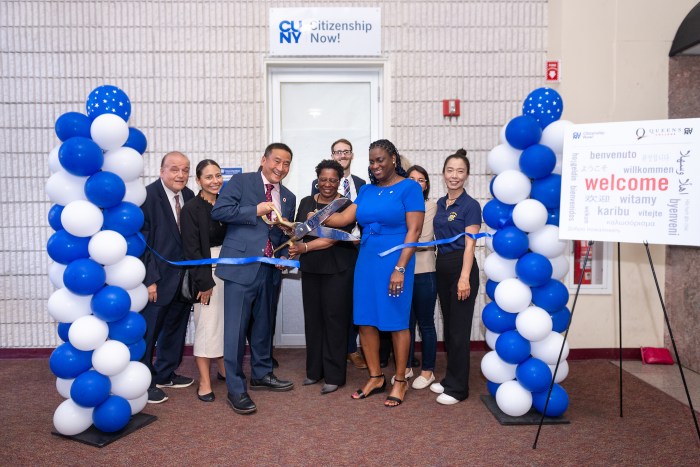Something strange will happen Thursday evening at the Waldorf-Astoria: Donald Trump and Hillary Clinton will be nice to each other.
At least, that’s what tradition dictates when the two appear a few feet apart at the annual Alfred E. Smith Memorial Foundation Dinner.
Since 1960, almost every pair of major party presidential candidates has shared a dais at the white-tie event hosted by the Archdiocese of New York. The dinner is held to raise funds for children in neeed and in memory of four-term New York Gov. Al Smith, the first Catholic presidential nominee (he lost badly, which historians attribute at least in part to anti-Catholic bigotry).
The visuals will be startling — 24 hours after facing off in Wednesday night’s presidential debate, where Trump and Clinton are likely to brawl, the foes are scheduled to work a receiving line in the famed hotel’s Basildon Room. Then, they’ll share the dais at dinner, separated only by Cardinal Timothy Dolan, a clergyman known for his jovial presence.
“The dinner has always been an evening for the candidates to put partisan politics aside and come together to support this charitable cause,” says Joseph Zwilling, longtime spokesman for the archdiocese. He said the candidates’ speeches are always “good natured” and characterized by “self-deprecating humor.”
Will that be possible this year? And should it be?
A night for opponents to come together
Every year, the Al Smith dinner gathers New York’s Catholic eminences and virtually all of its highest political class. But in presidential election years, the event becomes a wildly sought-after ticket due to the joint appearance of the candidates just weeks before the general election.
John F. Kennedy and Richard Nixon set the genteel tone in 1960, with Kennedy saying gracefully that he was “glad” Nixon was there before going on to joke lightly about being a Catholic running for president and Nixon as a pottymouth.
President Jimmy Carter and Ronald Reagan kept it light in their 1980 appearance, with Reagan joking about his age and a fictionalized conversation he might have with Carter. The then-president said he found Reagan to be an “extremely engaging, charming man,” before applause from the crowd and a joke about Reagan’s campaign snipes about him.
In 2000, George W. Bush said Vice President Al Gore “is a person of energy and skill and determination. Mr. Vice President, I can’t wish you success, but I do wish you well.”
In 2008, Sen. Barack Obama (D-Ill.) praised Sen. John McCain’s dedication and honor in service of country. McCain (R.-Ariz.) called Obama an “impressive fellow” who was already making history. “I can’t wish my opponent luck, but I do wish him well,” he added.
Such rhetoric from past campaigns has the potential to make the listener or reader choke up a little with bipartisan pride. We’re a good country after all, our political champions capable of showing good sportsmanship.
But the event’s bipartisan nature is really a politics of a different kind: bolstering the Catholic Church’s influence, the archetype establishment. On two occasions, for example, candidates Bill Clinton and John Kerry were not offered invitations reportedly due to their actions or stances on abortion.
A parallel universe or a glimpse of reality?
If the candidates stick to the light banter of past years, it will be (as it has been in the past) a jarring disconnect from the emotion and calls to arms of the campaign season.
It will be a parallel view — for one evening, the jokes and nice manners rising above the philanthropic and political classes’ tinkling wine glasses will show that the fate of the republic isn’t really at stake, at least for those who can afford a $3,000 ticket. A few hours later, outside the bubble, it will be back to the contention that a vote for the other candidate would be dangerous for America.
In the past, chivalrous detente at the Al Smith dinner has been an indicator that, often, the two major party candidates tend not to be so far apart in issues, temperament, and fitness for the job that they can’t appear together without attacking each other. The outside partisanship is just vote-getting.
This year, the differences are more stark, and the candidates may have more to gain by continuing to butt heads.
In their last debate, the candidates previewed how they might play nice but still keep their guard up, with stiff and stilted answers when asked to praise their opponent. We may see more of the same careful dance Thursday.
In a hyper-heated political environment where even clips of jokes can circulate widely and feed supporters’ or antagonists’ fervor, the view from the Al Smith dinner might not clash with the one from your couch on a normal campaign day. Then at least we’ll all be sharing the same meal inside and outside the room.

















